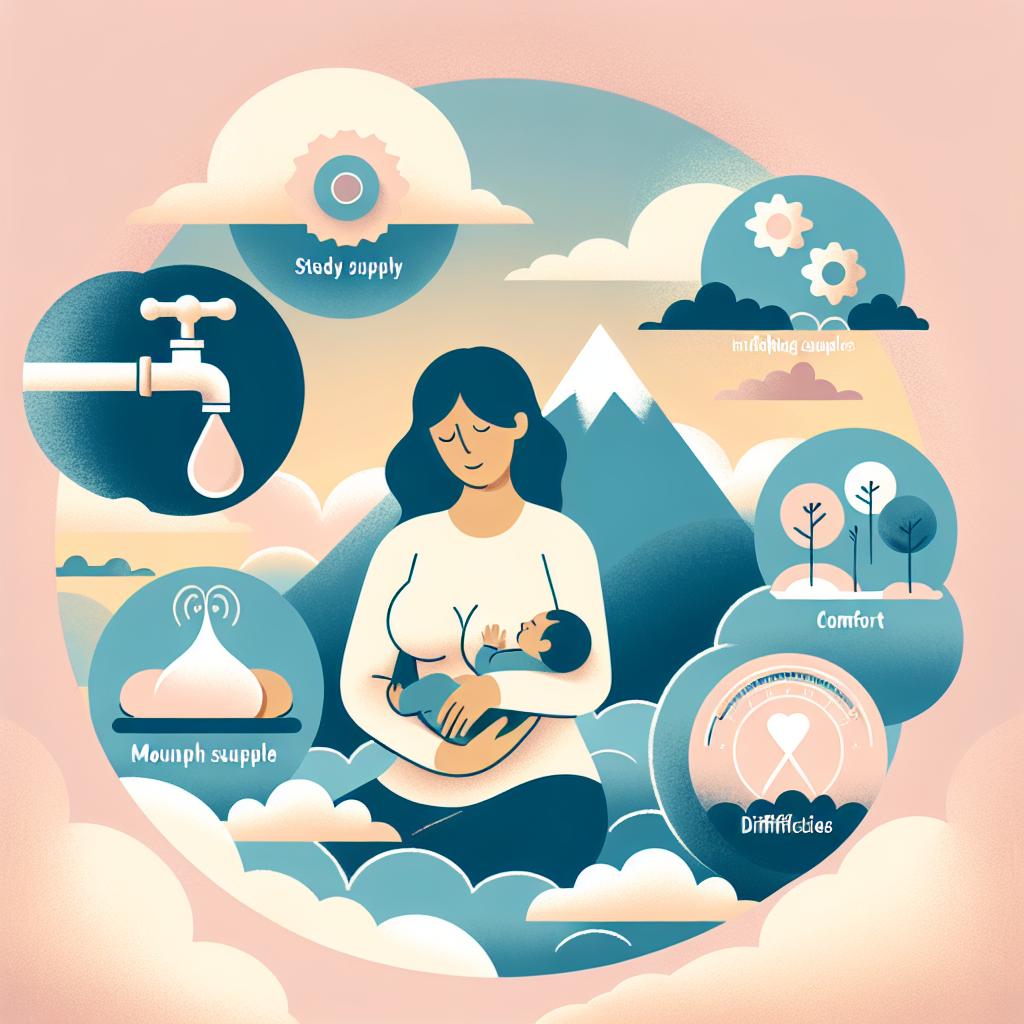Recognizing Breastfeeding Challenges
Breastfeeding, while natural, can often come with its own set of breastfeeding challenges. It’s crucial to understand, however, that these difficulties are common and countless mothers have successfully overcome them. In fact, MedlinePlus reinforces that numerous solutions are available to tackle these issues. Let’s delve into recognising these challenges and the tips for overcoming them.
Common Breastfeeding Challenges
From maintaining a steady milk supply to ensuring your newborn latches properly, various problems can arise. Here are some common challenges mothers face:
- Low Milk Supply: Some mothers struggle with producing enough milk. This could be due to various reasons, including stress, dehydration, illness or certain medications.
- Latching Difficulties: At times, a newborn may have trouble latching onto the breast correctly. This can cause discomfort for the mother and can impact the baby’s nutrition.
- Sore or Cracked Nipples: Breastfeeding can sometimes cause soreness or even cracked nipples. This can be quite painful and intimidating for new mothers.
- Breast Engorgement: This is when your breasts become overly full of milk. It can lead to painful, hard breasts and can make breastfeeding difficult.
- Mastitis: This is an infection of the breast tissue causing breast pain, swelling, warmth, and redness. You might also feel ill with flu-like symptoms.
Overcoming Breastfeeding Difficulties
Thankfully, there are several solutions to help you face these breastfeeding challenges head-on. The key is to bear in mind that every mother and baby’s journey is unique, and there is no one-size-fits-all when it comes to breastfeeding. Let’s explore some general tips.
Maintaining Milk Supply
One of the best ways to enhance your milk production is to ensure you’re staying hydrated and eating a balanced diet. While breastfeeding, your body needs extra calories and nutrients. According to Irina Sukhanova, an IBCLC certified lactation consultant, it’s crucial to feed your baby often and as needed to stimulate milk production.
Comfort Techniques for Latching Difficulties
To encourage a good latch, aim to hold your baby skin-to-skin as much as possible. This can help your baby use their instincts to start breastfeeding. If you continue to struggle, don’t hesitate to seek help. Many hospitals offer services or can recommend a lactation consultant, like the ones at West Texas Pediatric Dentistry, who will guide you through different breastfeeding positions and latch techniques.
Overcoming Sore or Cracked Nipples
You can overcome this by ensuring your baby is latching correctly. Additionally, applying nipple cream or expressing a little milk and rubbing it on your nipples can be quite effective. If the problem persists, it’s worth consulting with a healthcare provider.
While these tips are a good starting point, it’s important to remember every mother and baby are different. If you have persistent issues, don’t hesitate to reach out to a healthcare provider or lactation consultant. They can offer you personalized advice based on your situation.
Remember, breastfeeding may not always be easy, but the benefits for your baby and the bond it helps to create between you and your child make it all worthwhile. So, stay patient, keep trying, and know that you’re not alone in this journey.
Identifying Underlying Physical Causes
Sometimes, breastfeeding problems may be due to physical issues present in either the mother or the baby. Understanding these can aid in seeking appropriate solutions.
Tongue or Lip Ties
According to the La Leche League International (LLLI), a baby with a tongue or lip tie can have difficulties latching onto the breast properly. This is because these conditions restrict the mobility of the baby’s mouth, leading to shallow latches that can cause nipple soreness and inadequate milk consumption. You might need to consult a paediatrician or an ear/nose/throat (ENT) specialist who can provide appropriate advice or treatment if necessary.
Breast Abscess
Continued milk accumulation in the breast can lead to a painful condition known as Breast Abscess, as highlighted by NCBI. Breast abscess is an infection characterized by the formation of pus-filled cavities in the breast tissue. If you notice redness, warmth, swelling along with fever and chills, consult a healthcare professional immediately.
Preventing Breast Engorgement and Mastitis
According to UNICEF, consistent milk removal from the breasts and allowing the baby to control feeding times can significantly help prevent issues of breast engorgement and mastitis. However, if these conditions develop, it’s crucial to keep breastfeeding or pumping milk to aid in alleviating the discomfort and resolving the issue.
Breastfeeding Challenges and Mental Health
It’s important to note that breastfeeding difficulties can affect a mother’s mental health significantly. Feelings of stress or failure can exacerbate the problem, making it even more challenging to breastfeed. Thus, caring for personal mental health is as crucial as resolving physical issues.
Support For Breastfeeding Challenges
Dealing with breastfeeding problems can seem overwhelming at times. But remember, you don’t need to face it alone. Many supportive resources are available to help in your journey:
- Lactation Consultants: Certified lactation consultants are professionals trained to help mothers with breastfeeding. They can assess feeding positions, help with latch problems, suggest ways to increase milk supply, and more.
- Healthcare Providers: Regularly consulting with a healthcare provider can help identify potential problems early and find effective solutions.
- Peer Support Groups: Groups such as La Leche League offer mother-to-mother support, where experienced nursing mothers can provide guidance, share experiences, and offer encouragement.
Bear in Mind…
Finally, remember, breastfeeding is a unique journey, filled with moments of joy, difficulties, and achievements. Be gentle with yourself, take one step at a time, and celebrate each small victory. You’re doing a wonderful job as a mother!
